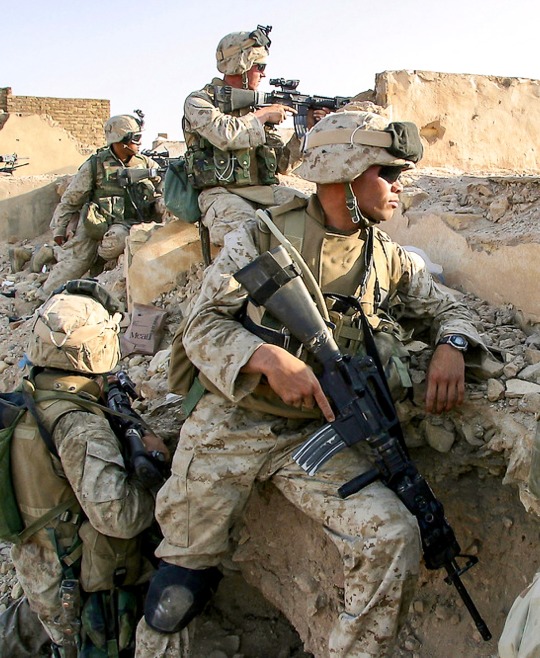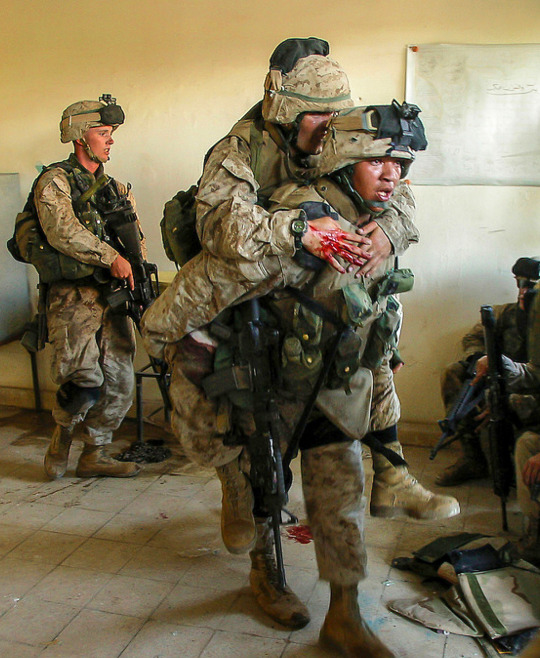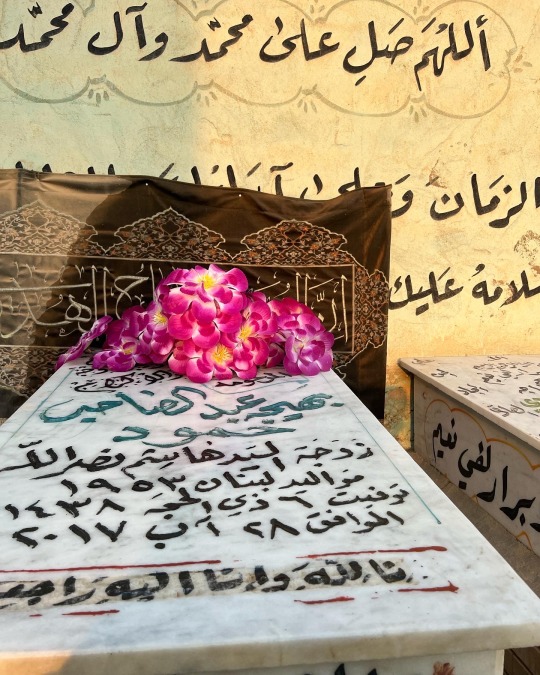#najaf
Text

U.S. Marines from 1st Battalion, 4th Marine Regiment, 11th Marine Expeditionary Unit, take up positions behind battle-damaged walls as they continue to engage the fighters of the Montana al-Sadr-led Mehdi Army during the Battle of Najaf in August, 2004.
(Photo by: Lucian Read)
#usmc#us marines#infantry#grunts#najaf#battle of najaf#operation iraqi freedom#military#warrior wednesday
9K notes
·
View notes
Text
Who is Hazrat Ali ع;
The quencher of Kawthar, no one but Ali ع !
The conquerer of Khayber, no one but Ali ع !
The lion of God, no one but Ali ع !
The hope of Orphans, no one but Ali ع !
The confidant of Allah's secrets, no one but Ali ع !
The gateway to the knowledge of Muhammad ص is, no one but Ali ع !
#imam ali#imamali#shiaquotes#shiaislam#shia#hazratali#hazrat ali quotes#hazrat ali as#yaalimadad#yaali#najaf#karbala#rajab#13rajab#birth anniversary#imama#imam hussain#manqabat#yazainab#samirah al abbas#labaikyahussain#امام علی#امام حسين#نجف#کربلا#fyp#explore#relatable posts#desiblr#trending
45 notes
·
View notes
Text

#Save palestine#Gaza#karbala#iran#najaf#free palestine#ahlulbayt#quran#imam hussain#ashura#Imam ali#Save gaza#Ceasefire#Israel#Middle east#Children#Terrorism#Tel aviv
18 notes
·
View notes
Text
Population: 747,261
8 notes
·
View notes
Text
اللهم العن قتلة أمير المؤمنين عليه السلام 🖤
17 notes
·
View notes
Text
Reading Useless Sunni Books
The divide between Sunni and Shia perspectives runs deep, shaping beliefs, practices, and interpretations of religious texts. For Shia Muslims, the question often arises: should one engage with Sunni literature for understanding Islam? The answer, for many, lies in a nuanced exploration of the implications and limitations of such endeavors.
Shia Muslims, grounded in their belief in the infallibility and authority of the Ahlulbayt, often view Sunni literature with skepticism. While some may argue for the utility of Sunni books in debates or comparative religious studies, the inherent risks and pitfalls of relying on these sources for doctrinal guidance cannot be overstated.
One fundamental concern is the potential distortion of the Prophet Muhammad's character and teachings as depicted in Sunni texts. From accounts of his marriages to his interactions with companions, the narratives presented in Sunni literature often diverge significantly from Shia beliefs. The portrayal of the Prophet engaging in actions or making statements that contradict Shia doctrines can be deeply unsettling for adherents of the Shia faith.
For instance, Sunni texts depict the Prophet Muhammad marrying children as young as 6 years old, or engaging in behaviors that Shia Muslims find incompatible with their understanding of prophethood. These disparities can lead to confusion, cognitive dissonance, and false impressions of Mohammad SAWS.
Furthermore, the reliance on Sunni literature as authoritative sources of Islam can inadvertently validate narratives that undermine Shia theology. Accounts of companions correcting or admonishing the Prophet Muhammad, as found in Sunni texts. The conclusion from many Sunni text is that Mohammad was just an average Joe guy who often gets corrected by his companions on numerous occasions.
It is essential to recognize that the divergence between Sunni and Shia perspectives is not merely academic; it is deeply rooted in theological differences that shape religious identity and practice. For Shia Muslims, the Quran and the teachings of Ahlulbayt serve as the primary sources of guidance and authority. The emphasis on the Imams, as the inheritors of prophetic knowledge and authority, distinguishes Shia Islam from its Sunni counterpart.
While engaging with Sunni literature for comparative purposes or scholarly discourse may have its merits, Shia Muslims must approach such endeavors with caution and critical scrutiny. Blind acceptance of narratives that conflict with Shia beliefs in the infallibility of Mohammad and his holy Family SAWS.
In conclusion, while there may be occasional utility in engaging with Sunni literature for certain purposes, such as debates or comparative studies, Shia Muslims must exercise caution and discernment. Relying on Sunni sources for doctrinal guidance or spiritual nourishment poses significant risks to the integrity of Shia beliefs and can lead to confusion and discord within the community. Ultimately, the Quran and the teachings of Ahlulbayt remain the cornerstone of Shia faith and identity, providing a steadfast anchor in the seas of religious discourse. The Prophet said "I leave behind the Quran and Ahlulbayt."
Side Note: Sunni books are absolutely useless, beyond the nature of their uselessness for debates; to read any Sunni book as a genuine source of spiritual guidance would lead anyone to the conclusion that "a Prophet," was a child molester, terrorist, and warmonger, who also walked in on his adopted son's wife and fell in love with her body.
3 notes
·
View notes
Photo

Civilian contractors from private security company Blackwater taking part in firefight in Najaf, Iraq, in 2004.
36 notes
·
View notes
Photo

. . روي عن الإمام الباقر(عليه السلام)أنه قال: إن محمدا (صل الله عليه وآله) كان أمين الله في أرضه، فلما: قبضه الله كنا أهل البيت ورثته فنحن أمناء الله في أرضه 📚المصدر (بحار الأنوار - العلامة المجلسي - ج ٢٦ - الصفحة ٢٤٩) . . 🔵تفضلوا جميع الصور لكم ولا تنسونا من الدعاء🔵 #كربلاء #النجف #ويبقى_الحسين #سامراء #الكاظمية #البحرين #الحسن #الحسين #فاطمة #أمير_المؤمنين #بغداد #البقيع #الشيعة #iraq #karbala #najaf #bahrain #iran #محرم #kademalkesa #ويبقى_الحسين #ياحسين #shia #الاحساء #كويت #lebanon #العراق #القطيف . . . . . 🍃لطفا اذا اعجبك المحتوى اعمل لايك، واذا كنت تعتقد ان المحتوى سينفع شخص آخر ، اعمل له منشن https://www.instagram.com/p/CoeS5tfM8N5/?igshid=NGJjMDIxMWI=
#كربلاء#النجف#ويبقى_الحسين#سامراء#الكاظمية#البحرين#الحسن#الحسين#فاطمة#أمير_المؤمنين#بغداد#البقيع#الشيعة#iraq#karbala#najaf#bahrain#iran#محرم#kademalkesa#ياحسين#shia#الاحساء#كويت#lebanon#العراق#القطيف
18 notes
·
View notes
Text
4 notes
·
View notes
Text

Hussain as is the martyrdom for whom Angles cried. 😭
33 notes
·
View notes
Text

During the Battle of Najaf, U.S. Marine James Hassell, risked his life to carry his wounded buddy, Ryan Borgstrom, 60 yards through open gunfire. When the photographer captured the moment, Hassell simply said, "We're Marines. That's what we do." The Marines of Charlie Company 1st Battalion 4th Marine Regiment carried out a raid on the Najaf residence of Moqtada al-Sadr during the Battle of Najaf on August 12, 2004.
(Photo by: Lucian Read)
#usmc#us marines#infantry#grunts#najaf#battle of najaf#operation iraqi freedom#military#warrior wednesday
154 notes
·
View notes
Text
Shah-e-Mardaan, Sher-e-Yazdaan, Quwwat-e-Parvardigaar, La Fata illa Ali, La Sayf illa Zulfiqaar
King of the brave, Lion of God, Strength of God, There is no brave young man like Ali [and] there is no sword like Zulfiqar.
#imamali#imam husayn#najaf#karbala#iraq#shiaquotes#shiall#shiaislam#shia muslims#shia#shia islam#imam hussain#imam mahdi#urdu#persian#persianwords#13rajab#writerblr#zulfiqar#sword#birth anniversary#کربلا#عراق#شیعہ#امام علی#امام حسين#yazainab#yaali#hazrat ali as
36 notes
·
View notes
Text


النجف الأشرف | The Holy city of Najaf 2022
12 notes
·
View notes
Text
youtube
2 notes
·
View notes
Text
Most Important Shia Books To Read
To gain a deeper understanding of the Ahlulbayt's perspective, consider reading these literary works:
1. Al-Ihtijaj by al-Tabrisi is a collection of hadiths presented by Shia scholar Ahmad b. Ali al-Tabrisi. The book focuses on narrations related to the Ahlulbayt.
2. Al-Murajaat is a book that presents a debate between Shia and Sunni scholarly viewpoints. It aims to clarify Shia beliefs and their foundation in Islamic scholarship.
3. Peshawar Nights is a record of debates between Shia and Sunni scholars that took place in Peshawar, Pakistan in the 1920s. It covers various topics related to Islamic theology and jurisprudence.
4. Nahj al-Balagha is a collection of sermons, letters, and sayings attributed to Imam Ali, a revered figure in Islam. It's known for its eloquence and is widely studied within Islamic scholarship.
5. Haqa'iq al-Shia is a Shia Islamic text presenting the beliefs of Twelver Shia Islam. The author, Sayyid Sadiq Shirazi, is a revered scholar in Shia Islam.
6. The Truth About the Shi'a Ithna Ashariya by Asad Wahid Al Qasim, a Sunni convert to the pure Islamic, Shia faith.
7. Succession To The Prophet Mohammad by Wilfred Madlung: A Non-Muslim Scholar's Perspective on Early Islamic History and the Resulting Civil Wars; and he reaches a conclusion in favor of the Ahlulbayt.
8. Succession to the Prophet Muhammad is another book that explores this topic, but from the perspective of Anila Sultan, a Sunni woman who converted to Shi'ism. This contrasts with Wilfred Madelung's scholarly examination of the succession.
9. For a look at the Shia creed through the eyes of a Sunni convert, consider Muhammad Tijani's works. Tijani, a former Sunni scholar who converted to Shi'ism, authored several books detailing his conversion journey and insights into Shia beliefs.
10. After gaining a solid foundation in Shia doctrine, readers can explore more advanced works like "Al-Kafi" by Al-Kulayni or "The Shia Creed" by Sheikh al-Saduq, a respected 12th Imam scholar. Sheikh al-Saduq's writings offer a comprehensive understanding of Shia beliefs and practices.
11. Ayesha by Kurt Frischler - This book offers a critical analysis of Aisha, one of the wives of Prophet Muhammad. It portrays her through a non-Islamic lens, highlighting controversial aspects of her character.
12. I saved the absolute best one for last: Tuhaf al-Uqul by Ibn Shu'ba al-Harrani is a revered collection of teachings attributed to the Prophet Muhammad and the Shia Imams. It's considered a profound resource for those familiar with Shia Islamic beliefs.
- Updated March 20, 2024
4 notes
·
View notes
